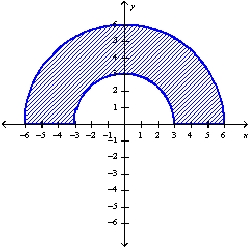Deck 12: Extension C: Multiple Integrals
Question
Question
Question
Question
Question
Question
Question
Question
Question
Question
Question

Unlock Deck
Sign up to unlock the cards in this deck!
Unlock Deck
Unlock Deck
1/11
Play
Full screen (f)
Deck 12: Extension C: Multiple Integrals
1
A swimming pool is circular with a  -ft diameter.The depth is constant along east-west lines and increases linearly from
-ft diameter.The depth is constant along east-west lines and increases linearly from  ft at the south end to
ft at the south end to  ft at the north end.Find the volume of water in the pool.
ft at the north end.Find the volume of water in the pool.
A)
B)
C)
D)
E)
 -ft diameter.The depth is constant along east-west lines and increases linearly from
-ft diameter.The depth is constant along east-west lines and increases linearly from  ft at the south end to
ft at the south end to  ft at the north end.Find the volume of water in the pool.
ft at the north end.Find the volume of water in the pool.A)

B)

C)

D)

E)


2
Use a double integral to find the area of the region R where R is bounded by the circle 
A)

B)

C)

D)


A)


B)


C)


D)




3
Determine whether to use polar coordinates or rectangular coordinates to evaluate the integral  ,where f is a continuous function.Then write an expression for the (iterated)integral.
,where f is a continuous function.Then write an expression for the (iterated)integral. 
 ,where f is a continuous function.Then write an expression for the (iterated)integral.
,where f is a continuous function.Then write an expression for the (iterated)integral. 
Polar, 

4
Use polar coordinates to find the volume of the solid under the paraboloid  and above the disk
and above the disk 
A)
B)
C)
D)
E)
 and above the disk
and above the disk 
A)

B)

C)

D)

E)


Unlock Deck
Unlock for access to all 11 flashcards in this deck.
Unlock Deck
k this deck
5
Use polar coordinates to evaluate. 


Unlock Deck
Unlock for access to all 11 flashcards in this deck.
Unlock Deck
k this deck
6
Use polar coordinates to find the volume of the sphere of radius  Round to two decimal places.
Round to two decimal places.
A)
B)
C)
D)
E)
 Round to two decimal places.
Round to two decimal places.A)

B)

C)

D)

E)


Unlock Deck
Unlock for access to all 11 flashcards in this deck.
Unlock Deck
k this deck
7
Use polar coordinates to find the volume of the solid bounded by the paraboloid  and the plane
and the plane 
A)
B)
C)
D)
E)
 and the plane
and the plane 
A)

B)

C)

D)

E)


Unlock Deck
Unlock for access to all 11 flashcards in this deck.
Unlock Deck
k this deck
8
An agricultural sprinkler distributes water in a circular pattern of radius  ft.It supplies water to a depth of
ft.It supplies water to a depth of  feet per hour at a distance of
feet per hour at a distance of  feet from the sprinkler.What is the total amount of water supplied per hour to the region inside the circle of radius
feet from the sprinkler.What is the total amount of water supplied per hour to the region inside the circle of radius  feet centered at the sprinkler?
feet centered at the sprinkler?
 ft.It supplies water to a depth of
ft.It supplies water to a depth of  feet per hour at a distance of
feet per hour at a distance of  feet from the sprinkler.What is the total amount of water supplied per hour to the region inside the circle of radius
feet from the sprinkler.What is the total amount of water supplied per hour to the region inside the circle of radius  feet centered at the sprinkler?
feet centered at the sprinkler?
Unlock Deck
Unlock for access to all 11 flashcards in this deck.
Unlock Deck
k this deck
9
A cylindrical drill with radius  is used to bore a hole through the center of a sphere of radius
is used to bore a hole through the center of a sphere of radius  Find the volume of the ring-shaped solid that remains.Round the answer to the nearest hundredth.
Find the volume of the ring-shaped solid that remains.Round the answer to the nearest hundredth.
 is used to bore a hole through the center of a sphere of radius
is used to bore a hole through the center of a sphere of radius  Find the volume of the ring-shaped solid that remains.Round the answer to the nearest hundredth.
Find the volume of the ring-shaped solid that remains.Round the answer to the nearest hundredth.
Unlock Deck
Unlock for access to all 11 flashcards in this deck.
Unlock Deck
k this deck
10
Evaluate the iterated integral by converting to polar coordinates.Round the answer to two decimal places. 
A)
B)
C)
D)
E)

A)

B)

C)

D)

E)


Unlock Deck
Unlock for access to all 11 flashcards in this deck.
Unlock Deck
k this deck
11
Evaluate the integral  ,where R is the annular region bounded by the circles
,where R is the annular region bounded by the circles  and
and  by changing to polar coordinates.
by changing to polar coordinates.
 ,where R is the annular region bounded by the circles
,where R is the annular region bounded by the circles  and
and  by changing to polar coordinates.
by changing to polar coordinates.
Unlock Deck
Unlock for access to all 11 flashcards in this deck.
Unlock Deck
k this deck



